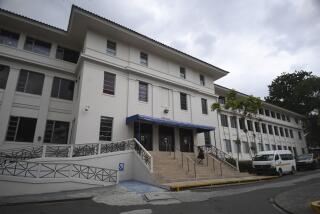Landmark Trial on Secondhand Smoke Opens
- Share via
MIAMI — Cigarette makers have fraudulently sustained “a nonexistent controversy” about the risks of secondhand smoke with fatal consequences for many Americans, a lawyer for U.S. flight attendants declared in opening arguments Monday in a landmark tobacco trial.
Bans on smoking in airlines and other enclosed spaces would have been imposed much sooner “if not for the interference and untruths told by the tobacco industry,” attorney Stanley M. Rosenblatt said. “Many, many lives would have been saved by an earlier ban,” he told jurors in a courtroom packed with lawyers and representatives of more than two dozen news organizations and several Wall Street investment firms.
The case, filed on behalf of flight attendants claiming to have suffered health damage before the 1989 ban on airline smoking, is the first class-action suit to be tried against tobacco firms, who in every previous case have squared off against individual smokers.
It is also the first court case of any kind to test the industry’s liability for lung cancer and other illnesses supposedly suffered by bystanders from other people’s cigarettes. Industry lawyers today will deliver their opening statements in the two-stage trial, the first phase of which could last at least two months.
The 6-year-old lawsuit, Broin vs. Philip Morris, is named for Norma Broin, 42, a lifelong nonsmoker who was diagnosed with lung cancer in 1989 after 13 years as a flight attendant for American Airlines. Broin, whose illness is in remission, was one of several flight attendants in the courtroom Monday. She declined to talk to reporters on the advice of her attorneys.
The trial in Dade County Circuit Court formally began June 2 but quickly lost media attention during a tortuous six weeks of jury selection.
The case also has been overshadowed by the giant tobacco truce announced June 20. The $368.5-billion accord, if ratified by Congress, will settle a slew of class-action lawsuits and prevent such suits from being filed in the future. However, Rosenblatt wanted no part of the settlement and is going ahead with Broin and a second class action he filed on behalf of Florida smokers.
But while denouncing the tobacco deal as “a farce,” Rosenblatt and his clients could be major beneficiaries should jurors be influenced by settlement news.
Jurors have been admonished by Judge Robert P. Kaye to avoid reading or viewing tobacco-related news, and defense lawyers are concerned that they might regard the settlement as a tacit admission that the Broin case is on target.
As part of the settlement, for example, the industry agreed to adopt a series of tougher cigarette warning labels, including one that states, “Tobacco smoke causes fatal lung disease in nonsmokers”--a position contrary to the one the industry is taking in the Broin case.
At a news conference after court adjourned Monday, Dan Donahue, senior vice president and deputy general counsel of R.J. Reynolds Tobacco, said the proposed warning label was not an admission.
“There has been and is no concession relating to” secondhand smoke, he said.
Another industry representative, speaking on condition of anonymity, acknowledged the difficulty posed by the settlement.
The Broin case “is as winnable as any [the] industry could face,” he said. “Yet it’s being tried in probably the most difficult set of circumstances and timing imaginable.”
Even so, it was the plaintiffs who got off to a rocky start Monday, as Rosenblatt’s 2 1/2-hour opening was interrupted more than 20 times by objections by industry lawyers. Kaye sustained many of the objections, repeatedly admonishing Rosenblatt to stick to summarizing his evidence and refrain from argument.
Rosenblatt promised to prove that all the “diseases caused by active smoking are caused by secondhand smoke as well.” He told jurors that his clients, unlike sick smokers, could not be held responsible for their tobacco-related ailments.
“All of our flight attendants made a choice not to smoke,” Rosenblatt said, but they “all had to breathe.”
Rosenblatt told jurors his witnesses will include former Surgeon General Jesse L. Steinfeld, who Rosenblatt said had pushed for controls on secondhand smoke back in the early ‘70s but was forced to resign during the Nixon administration after being targeted by the tobacco industry.
He contended that there are parallels between the industry’s stance on secondhand smoke and its defense of active smoking--saying both have involved a strategy of belittling and nit-picking scientific evidence to “plant doubt in the minds of the American people.”
Rosenblatt showed jurors a blowup of the historic “Frank Statement to Cigarette Smokers”--published in 1954 as a full-page ad in more than 400 U.S. newspapers. In it, industry officials asserted that public health was their “paramount” concern and pledged to fund research to learn the truth about smoking and health.
But “the evidence will show that what was paramount in their business was profits--not the health of the American people,” Rosenblatt said.
In the first phase of the trial, the plaintiffs will try to prove that secondhand smoke causes lung cancer and other ailments. They will also try to show that the industry knew the dangers and lied about them or covered them up.
If Rosenblatt clears that hurdle, he will face the more difficult task of proving that illnesses of specific flight attendants resulted from secondhand smoke. The class has 28 representatives, whose medical conditions would be the subject of smaller trials in the second phase.
Rosenblatt has estimated that as many as 60,000 flight attendants may have valid claims of impaired health--a number the industry says is wildly exaggerated.
More to Read
Inside the business of entertainment
The Wide Shot brings you news, analysis and insights on everything from streaming wars to production — and what it all means for the future.
You may occasionally receive promotional content from the Los Angeles Times.










